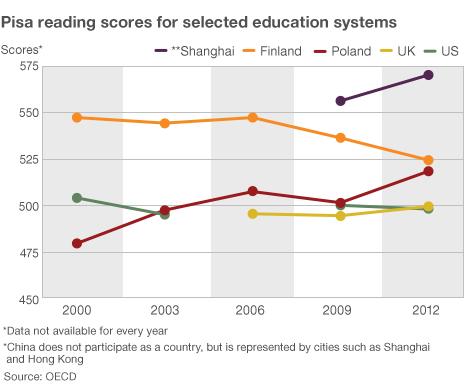UK makes no progress in Pisa tests
- Published

The UK has failed to make any progress in catching up global rivals in school tests taken by teenagers in maths, reading and science - and is no longer in the top 20 for any subject.
The results of the OECD's Pisa tests are particularly poor for Wales, which trails behind the rest of the UK.
Wales has fallen below average in tests taken by 500,000 pupils.
Andreas Schleicher, who runs the tests, says the UK's performance has "flat-lined" while competitors have improved.
In science, the UK has slipped downwards, from 16th to 21st place, in a downward trend for results in the subject.
The UK remains stuck among the average, middle-ranking countries, in 26th place for maths and 23rd for reading, broadly similar to three years ago.
Middle ranking
In a breakdown of the UK results, England, Scotland and Northern Ireland are clustered around the average.
Scotland has overtaken England in maths and reading, with England ahead in science tests. Northern Ireland is in third place for the three subjects.
Wales was behind in all three subjects.
Launching the results, Mr Schleicher said the UK spent more in relative terms than most other countries on education. It was also more successful than most at improving the test results of immigrant children.
But he said that the test results showed the UK's school system had so far failed to improve as quickly as other countries, such as Poland in eastern Europe and Vietnam in south-east Asia, which are now ranked higher.
England's Education Secretary Michael Gove said: "These poor results show the last government failed to secure the improvements in school standards our young people desperately need.
"Labour poured billions of pounds into schools and ratcheted up exam grades - yet our education system stagnated and we fell behind other nations.
"This performance underlines the urgent need for our reforms. Only by learning from other nations and confronting failure at home will we give young people a fighting chance of competing for the jobs of the future."
Teacher quality
In response, Labour's Shadow Education Secretary Tristram Hunt said the results showed the importance of high-quality teachers.
"This report exposes the failings of this government's schools policy: a policy that has sent unqualified teachers into the classroom and prevented effective collaboration between schools."
Mr Hunt said the government was "charting a course that will make our international standing worse, not better".
The deputy leader of the ASCL head teachers' union, Malcolm Trobe, said it was "far too early" for these international tests to show the impact of current education policies.
Mary Bousted, leader of the ATL teachers' union, warned politicians against "misusing the Pisa results to score political points" and cautioned that "everyone needs to remember that PISA is not an exact science".
Christine Blower, leader of the National Union of Teachers, said the results showed that successful education systems "pay teachers well, respect the profession and encourage collaboration between teachers and schools".
There were also voices of caution about how these results should be interpreted.
Prof David Spieghalter from the University of Cambridge said "we should be very cautious in the lessons to be learned" - and that measuring quality in education was not straightforward.
He also highlighted that while South Korean teenagers were at the top end of test results, they were also the unhappiest about their time in school.
Prof Alan Smithers from the Centre for Education and Employment Research, University of Buckingham said there were many factors outside school that shaped test results.
"It is disappointing that the UK's 15-year-olds should come so far down the Pisa tables, but is it the fault of the schools? So many other things affect the scores. In the Asian countries that do so well, there are tiger mothers and a lot of out-of school tuition."
He said that the UK could boost its position by training students to take the tests, but that was not the same thing as improving the education system.
"The danger in the exaggerated importance that politicians attach to Pisa, is that implicitly they are pushing the world to a narrow and particular view of education," said Prof Smithers.
- Published3 December 2013
- Published3 December 2013
- Published3 December 2013
- Published27 November 2013